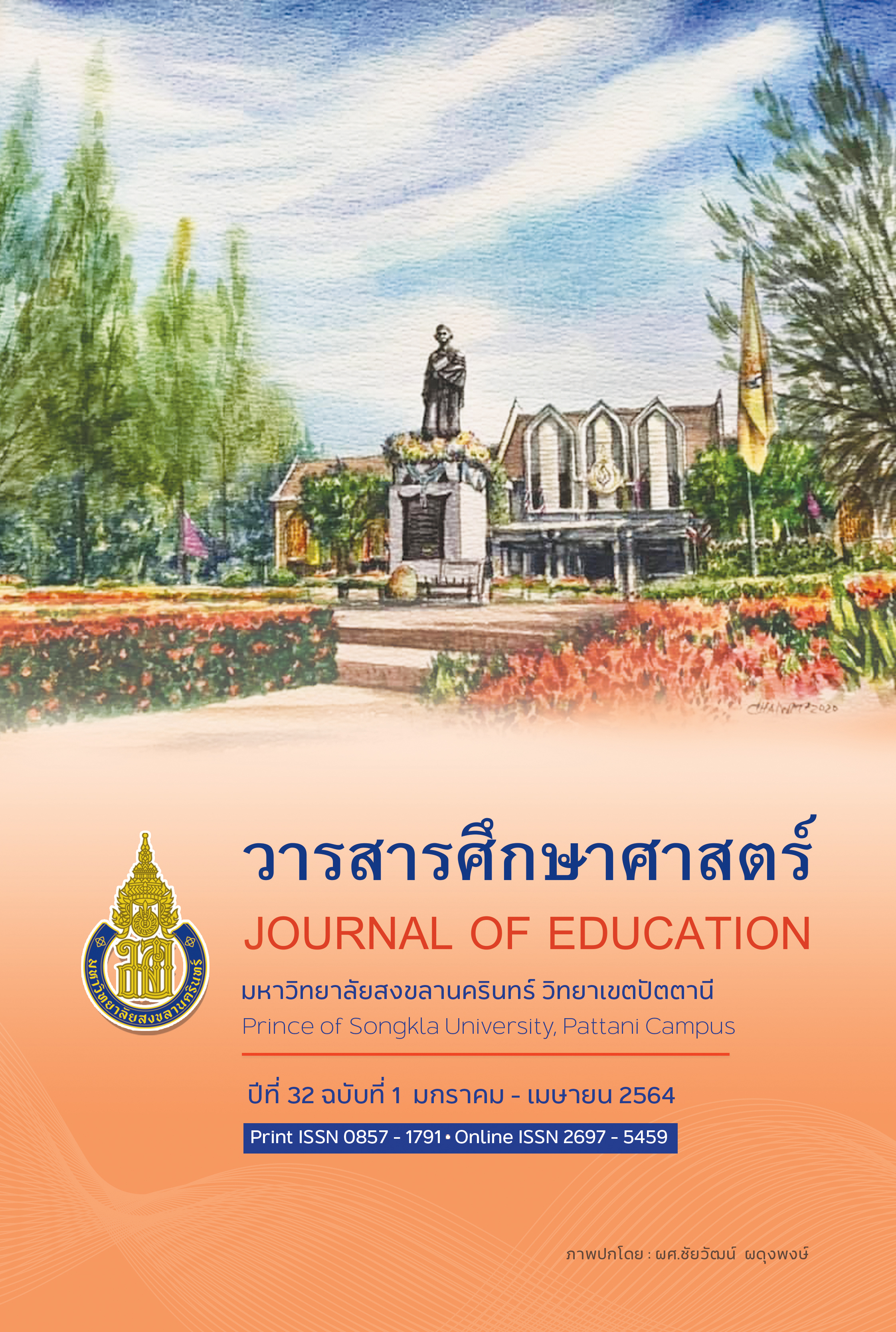The Synthesis of the Competency Framework of the Educational Technologists (Eng)
Main Article Content
บทคัดย่อ
The rapid transition of the technological world into the digital era affects every career to adjust their strategies of human resources management to achieve their goal set by the important tool which is the competency of personnel, and the educational technologist is one of the careers who is affected. For this reason, the competency of the educational technologists needs to be developed to build the professional security and clarity of their roles among the sustainable change of the world. The purposes of the study are to synthesize the competency framework of the educational technologist by collecting the qualitative data which is the documentary research, and the semi-structured interviews were provided by educational technology experts. The results of this synthesis have shown that competency framework of the educational technologist consisted of 6 competencies as follows: 1) professional academic knowledge 2) professional skills 3) professional characteristics 4) management 5) professional development, and 6) consultancy. The competency from the educational technology synthesis will lead to the next process of competency setting to lift the educational technologist's practice to be accepted by the society.
Article Details
เอกสารอ้างอิง
Achcaoucaou, F., Forgas-Coll, S., & Palau-Saumell, R. (2014). Exploring the Use of an ICT-Based Tool for assessing Competencies in Postgraduate Students. In M. Peris-Ortiz, F. J. Garrigós-Simón, & I. Gil Pechuán (Eds.), Innovation and Teaching Technologies: New Directions in Research, Practice, and Policy (pp. 87-97). Cham: Springer International Publishing.
Ally, M. (2019). Competency Profile of the Digital and Online Teacher in Future Education. International Review of Research in Open and Distributed Learning, 20(2). doi: https://doi.org/10.19173/irrodl.v20i2.4206
Association for Educational Communications and Technology. (2012). AECT Standards, 2012 version. Retrieved from https://c.ymcdn.com/sites/aect.siteym.com/resource/resmgr/AECT_Documents/AECTstandards2012.pdf
Cenkner M, Sonnenberg L, von Hauff P, Wong C. (2017). Integrating the educational Technology expert in medical education: A role-based competency framework, MedEdPublish, 6(2), 1-19. doi:https://doi.org/10.15694/mep.2017.000079
Foulger, T.S., Graziano, K.J., Schmidt-Crawford, D. & Slykhuis, D.A. (2017). Teacher Educator Technology Competencies. Journal of Technology and Teacher Education, 25(4), 413-448.
Fox, O., & Sumner, N. (2014). Analyzing the Roles, Activities, and Skills of Learning technologists: A Case Study From City University London. American Journal of Distance Education, 28(2), 92-102. doi:10.1080/08923647.2014.897465
Hartley, R., Kinshuk, Koper, R., Okamoto, T., & Spector, J. M. (2010). The education and training of learning technologists: A competencies approach. Journal of Educational Technology & Society, 13(2), 206-216.
Impagliazzo, J., Sabin, M., Alrumaih, H., & Viola, B. (2016, April). An information technology competency model and curriculum. In 2016 IEEE Global Engineering Education Conference (EDUCON) (pp. 892-895). IEEE.
Iqdami, M. N., & Branch, R. M. (2016). Examining Multimedia Competencies for Educational Technologists in Higher Education. TechTrends, 60(4), 365-373. doi: 10.1007/s11528-016-0064-1
İzmirli, Ö. Ş., & Kurt, A. A. (2009). Basic competencies of instructional technologists. Procedia-Social and Behavioral Sciences, 1(1), 998-1002. doi: http://dx.doi.org/10.1016/j.sbspro.2009.01.178.
Kang, Y., &Ritzhaupt, A. D. (2015). A job announcement analysis of educational technology professional positions: Knowledge, skills, and abilities. Journal of Educational Technology Systems, 43(3), 231-256.
Khammanee, T. (2018). Teaching Knowledge: Body of knowledge for learning efficient Process. (22nd printing). Bangkok: Chulalongkorn University.
Li, F., & Zhang, M. (2016). Based on computer technology of educational competency research for preschool teachers. In the 2016 11th International Conference on Computer Science & Education (ICCSE) (pp. 704-707). IEEE.
Office of the Civil Service BMA Committee. (2015). Competencies of permanent BMA civil servant group. Retrieved from http://office.bangkok.go.th/csc/images/Files/Completency/completency_groupN.pdf
Office of the Civil Servants (2010). The manual of specifications of knowledge, skills and Competencies of positions. Retrieved from https://www.ocsc.go.th/sites/default/files/document/25531130-khuumuuekaarkamhndkhwaamruukhwaamsaamaarth-thaksa-aelasmrrthnasamhrabtamaehnng-ISBN-9786165480703-ephyaephr-2553.pdf
Office of Human Resources Administration, Department of Medical Service, Ministry of Health. (2012). Competencies of general civil staffs of Department of Medical Service B.E. 2012. Retrieved from http://203.157.39.7/hrm/2012/capacity/2_c1.pdf
Phankhong, N. (2016). The indicator Development of Competencies of information and communication technology of Rajabhat Universities’ lecturers. [Doctoral dissertation, King Mongkut’s University of Technology North Bangkok] Bangkok.
Phomwongse, C. (1991). Framework and role of educational technology. Journal of Sukhothaithamathiraj. 4(2),2-9.
Ritzhaupt, A. D., & Martin, F. (2014). Development and validation of the educational technologist multimedia competency survey. Educational Technology Research and Development, 62(1), 13-33. doi:10.1007/s11423-013-9325-2
Smitikrai, C. (2013). Recruitment, selection and evaluation performance of staffs (4th Printing). Bangkok: Chulalongkorn University Press.
Thammetha, T. (2003). The development of performance standard of educational technology work in Higher Education of Thailand. [Doctoral dissertation, Chulalongkorn University]. Bangkok.
The Ministry of Information, Communication, and Technology (2016). Digital Development for National Economic and Social. Retrieved from http://www.mdes.go.th/assets/portals/1/files/590613_4Digital_Economy_Plan-Book.pdf
Tristán-López, A., & Ylizaliturri-Salcedo, M. A. (2014). Evaluation of ICT competencies. In Handbook of research on educational communications and technology (pp. 323-336). Springer, New York, NY.
UNESCO. (2018). UNESCO ICT Competency Standards for Teachers Version 3.0. Retrieved From https://www.gcedclearinghouse.org/sites/default/files/resources/190056eng.pdf


